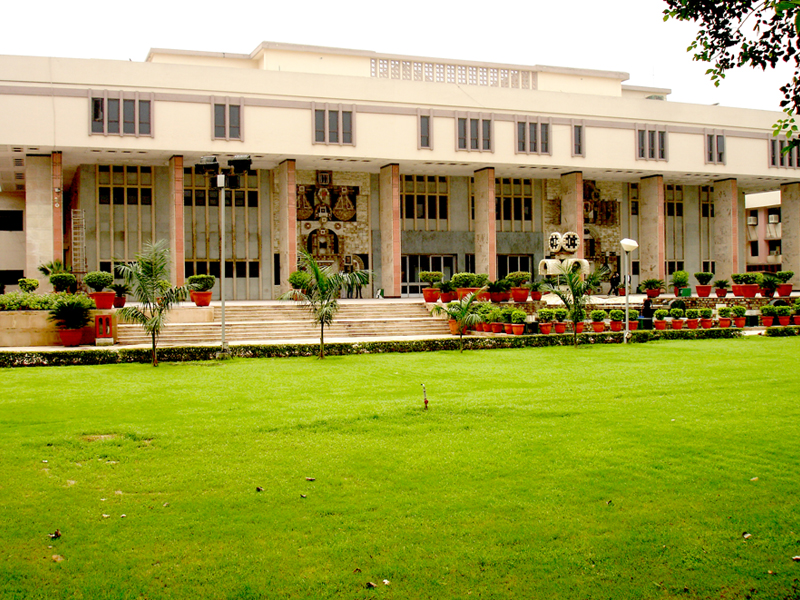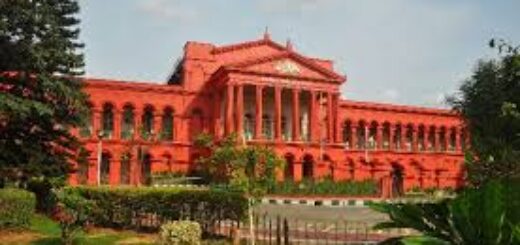The Delhi High Court stated that the installation of an optical fiber cable network benefits the defense forces and that these services are not subject to service tax.

The Delhi High Court canceled an Advance Ruling, stating that the work of laying an ‘Optical Fibre Cable Network’ is part of building civil infrastructure to improve communication for the defense forces. These services are exempt from service tax since the ultimate beneficiary is the Government of India. The Petitioner went to the High Court to request the records and to overturn the Advance Ruling made by the Respondent. They also asked for an Order to confirm that the services they provided to Respondent No. 5 under a purchase order are exempt from Service Tax because they are for the Government of India.
The Division Bench, which included Justice Yashwant Varma and Justice Dharmesh Sharma, noted that the Defense Services of the Government of India benefit from the services provided by the petitioner through subcontractors. They also pointed out that the services provided by BSNL to the DoT for the project are exempt from service tax under Entry 12A of the “Mega Exemption Notification” from June 20, 2012, along with Section 1023 of the Finance Act, 1994. By the same reasoning, the services provided by the petitioner to BSNL are also exempt from service tax under Entry 29(h) of the same notification.
Senior Advocate Tarun Gulati represented the Petitioner, while CGSC Bhagvan Swarup Shukla represented the Respondents. In 2013, Bharat Sanchar Nigam Limited (BSNL), acting as an “implementing agency,” issued a tender to establish a dedicated Optical Fiber Cable Network for the Defence Services under the ‘NFS2 Project’ across various regions in the country. The petitioner, a Government of India Enterprise, won the tender for part of the work (Package ‘C’: covering Rajasthan, Uttar Pradesh, and Uttarakhand) to install the optical fiber cable and provide related services. Following this, BSNL issued a Purchase Order (PO) to the petitioner for the supply of materials, NLD services, access services, and training under the project, totaling Rs. 14,48,60,76,007. It is important to note that clause (36) of the PO clearly stated that Service Tax does not apply to this order.
The Petitioner issued separate Purchase Orders to different sub-contractors for various tasks related to the NFS Project and included service tax in their invoices. However, BSNL reportedly refused to pay the service tax, claiming that the services provided by the petitioner were exempt under a Specific Exemption in Entry 12A of the 2012 Mega Exemption Notification. Confused about the responsibility to pay the service tax, the petitioner submitted an application to the Customs Authority for Advance Rulings (previously known as the Authority for Advance Rulings for Central Excise, Customs, and Service Tax). The Commissioner of Central Goods & Services Tax, Delhi South (formerly the Commissioner of Service Tax, Delhi-II) took a different position, stating that the Mega Exemption Notification did not apply to the Purchase Orders, and therefore, the project work was subject to service tax according to the relevant sections of the Finance Act, 1994.
This advance ruling was mainly challenged on the basis that BSNL only issued the tender as an “implementation agency,” earning 7.5% as “implementation charges” for the NFS Project, with the armed forces, specifically the Ministry of Defence, being the final beneficiary. The Bench observed that the Government of India, not BSNL, is the “recipient of service” in this situation. The 2012 notification fully exempts certain taxable services from the service tax under Section 66B of the Finance Act, 1994. This exemption, noted in Entry 12A(a), clearly applies to services provided to the government or a government authority related to construction, erection, commissioning, installation, completion, fitting out, repair, maintenance, renovation, or alteration of civil structures or other original works intended mainly for non-commercial use.
The work of establishing an “Optical Fibre Cable Network” is essentially about creating civil infrastructure to improve communication for the defense forces of the country. These services are exempt from service tax since the ultimate beneficiary is the Government of India. Additionally, Entry 29 (h) of the relevant notification states that subcontractors providing works contract services to other contractors are also exempt from service tax. The petitioners pointed out to the Court that among the 7 Purchase Orders (POs) issued under the same BSNL tender, the ruling against the petitioner in 2014 was inconsistent with a previous ruling favoring M/s Vindhya Telelinks Limited (VTL), which received a Refund Order under Section 102 of the Finance Act, 1994.
In response, the Bench noted that the respondents had applied different standards, leading to unequal tax treatment for similar cases without a valid reason. This unfair treatment infringes on the petitioner’s rights under Article 14 of the Constitution of India, 1950. Consequently, the Bench allowed the Writ Petition and annulled the disputed advance ruling made under Section 28E of the Customs Act, 1962. The petitioner is entitled to seek further relief based on the Court’s observations.
Cause Title: P.J. Dharmaraj v. Church of South India & Ors. [Neutral Citation: 2024 INSC 938 Appearance:
Petitioner: Senior Advocate Tarun Gulati, Advocates Rajat Bose, Ankit Sachdeva, Shohini Bhattacharya & Shruti Kulkarni
Respondents: CGSC Bhagvan Swarup Shukla,Senior Advocate Dinesh Agnani, Advocates Sarvan Kumar, SSC Harpreet Singh, Advocate Suhani Mathur, Leena Tuteja &. Ishita Kadyan








